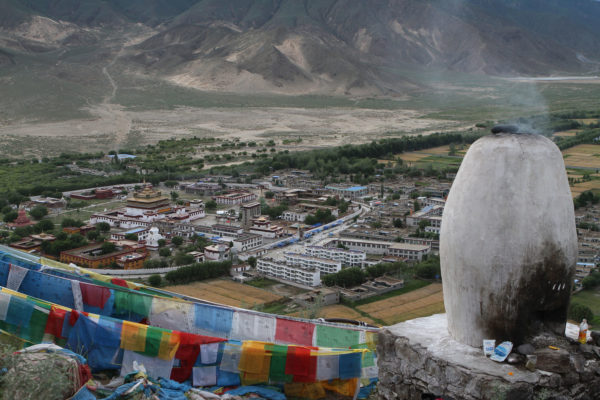
Tawni investigates the mind-body relationship foundational to cultivating healthy minds and bodies through biocultural and Tibetan medical paradigms for well-being. She examines markers and practices of flourishing in lives well-lived as well as processes of dying mindfully. She is particularly interested in work that contributes to understanding the cultural, social and environmental contexts that support practices and qualities of mind that lead to experiences of well-being across the life course, as well as aspects of its diversity among populations.
Tawni is a biocultural anthropologist and Tibetan medical doctor. Her research facilitates bridges across the Western scientific tradition and the Tibetan medical tradition, along with their attendant epistemologies, ontologies, and pedagogical methods. Her doctoral work focused on embodiment in textual-oral transmission and perceptual techniques in differential diagnostics.
Previously, she was a postdoctoral fellow at the Austrian Academy of Sciences (ERC-funded Project RATIMED) and the University of Vienna, where she examined pharmacological innovations in Tibetan medicine and training practices for medicine compounding, particularly across eastern Tibet. From 2020 to 2022 she served as Principal Investigator of the North American COVID-19 Tibetan Medical Observational Study (NACTMOS) as well as the Varela Study Examining Individual Differences in Contemplative Practice Response, funded by Mind & Life Institute.
Tawni is currently Project Manager of the Field Study of the Physiology of Meditation Practitioners and the Tukdam Meditative State (FMed, also known as the Tukdam Study), a collaborative research project with the Russian Academy of Sciences, Delek Hospital, Men-Tsee-Khang Tibetan Medical Institute, and a network of Tibetan Buddhist monastic institutions across India, guided by His Holiness the Dalai Lama. She also collaborates on the Austrian Science Fund Project Pandemic Narratives of Tibet and the Himalayas, where she contributes work on Tibetan medical responses to COVID-19 in Tibet and North America, and the Project Potent Substances in Sowa Rigpa and Buddhist Ritual, looking at concepts of potency in Tibetan pharmacology and medicine-compounding (menjor) for mind-body transformation.
She contributes transdisciplinary work to understanding gut disorders, cancer, and chronic inflammatory conditions. Her publications focus on diagnostic/treatment paradigms, pharmacological synergies, and modes of embodiment in contemplative practice, health and healing. She maintains a private clinical practice where sees a broad spectrum of patients.
Publications
Education
PhD, Biocultural Anthropology, Emory University
TMD (Tibetan Medical Doctor, Kachupa-equivalent Degree)
Sorig Loling Tibetan Medical College of Qinghai University (2013-2015), eastern Tibet (Xining, China), graduated 2015; Men-Tsee-Khang India (2010-2013)
MA, Anthropology, Emory University
BS, Earth Systems, Minor in Physics, Stanford University
What does well-being mean to me?
"Thriving in mind, body and being across diverse sociocultural and environmental contexts with openness, resilience, and vibrant joy."
Links
Related Studies
Examining Individual Differences in Contemplative Practice Response
This study seeks to build upon knowledge from Tibetan medicine through examining well-being data and microbiome measures on a variety of people with varying levels of meditation training who have participated in previous intervention studies to gain a better understanding of what works for whom and why.
The Field Study of Long-term Meditation Practitioners and the Tukdam Post-death Meditative State
A global community of field researchers are collaborating on a study of an ancient monastic post-mortem meditative state known as tukdam, practiced by present-day expert Tibetan Buddhists and how such a practice might offer insight into mental, spiritual, and physical well-being during the death process, both for the dying and for their support community.
Understanding the Mechanisms of Well-Being Training in Adults with and without Asthma
Center scientists and collaborators examine the impact of well-being training.




